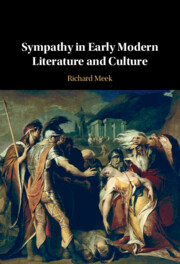Book contents
- Sympathy in Early Modern Literature and Culture
- Sympathy in Early Modern Literature and Culture
- Copyright page
- Contents
- Figures
- Acknowledgements
- Note on Texts
- Introduction
- Chapter 1 ‘A sympathy of affections’
- Chapter 2 ‘Compassion and mercie draw teares from the godlyfull often’
- Chapter 3 ‘Grief best is pleased with grief’s society’
- Chapter 4 ‘O, what a sympathy of woe is this’
- Chapter 5 ‘Soveraignes have a sympathie with subjects’
- Chapter 6 ‘As God loves Sympathy, God loves Symphony’
- Coda
- Bibliography
- Index
Chapter 5 - ‘Soveraignes have a sympathie with subjects’
The Politics of Sympathy in Jacobean England
Published online by Cambridge University Press: 27 April 2023
- Sympathy in Early Modern Literature and Culture
- Sympathy in Early Modern Literature and Culture
- Copyright page
- Contents
- Figures
- Acknowledgements
- Note on Texts
- Introduction
- Chapter 1 ‘A sympathy of affections’
- Chapter 2 ‘Compassion and mercie draw teares from the godlyfull often’
- Chapter 3 ‘Grief best is pleased with grief’s society’
- Chapter 4 ‘O, what a sympathy of woe is this’
- Chapter 5 ‘Soveraignes have a sympathie with subjects’
- Chapter 6 ‘As God loves Sympathy, God loves Symphony’
- Coda
- Bibliography
- Index
Summary
This chapter explores how the term sympathy was co-opted into political discourse in the first part of the seventeenth century, and how Jacobean literary and dramatic texts debated the political aspects of pity and compassion. Focusing on responses to the crises of succession and the plague, the chapter discusses the representation of sympathy in William Muggins’s Londons Mourning garment (1603), William Alexander’s The Tragedy of Croesus (1604), and Shakespeare’s King Lear (1608). It argues that King Lear exposes the ethical and philosophical problems involved in emotional perspective-taking, and points to the ways in which concepts of sympathy in this period were complicated by an individual’s class and status. The chapter then turns to royal elegies from the 1610s and 1620s, including poetic responses to the deaths of Prince Henry and Queen Anne. The chapter also explores several religious works that express concerns about a decline of sympathy during this period, and proposes that the increased bleakness of the 1623 Folio text of Lear may reflect wider social anxieties about what Thomas Medeley calls ‘this iron and flinty age’.
Keywords
- Type
- Chapter
- Information
- Sympathy in Early Modern Literature and Culture , pp. 176 - 214Publisher: Cambridge University PressPrint publication year: 2023

